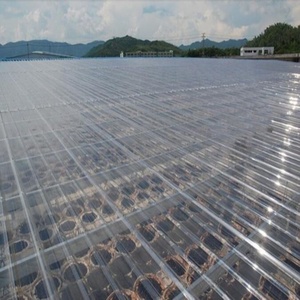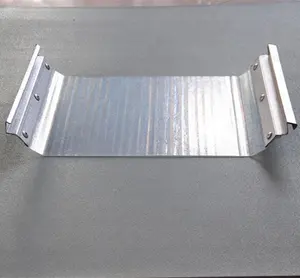(5224 products available)
















































































































































































































Fiber roof tiles, also known as fiber roof tiles or fiber-reinforced roof tiles, are a type of roofing material made from a combination of components. These components usually include cement or concrete, synthetic fibers (such as polypropylene or polyester), and sometimes other additives for durability and weather resistance. They are designed to resemble traditional clay or concrete tiles in appearance but are lighter and more flexible.
Fiber roof tiles come in various types, each with unique features and benefits. Here are some common types:
Fiber Cement Roof Tiles:
Fiber cement roof tiles are popular for their durability and low maintenance requirements. They are made from a mixture of cement, sand, and cellulose fibers. These tiles are non-combustible, meaning they do not catch fire easily and are resistant to rot, insects, and algae. They come in various styles and colors, resembling traditional clay or slate tiles. Fiber cement roof tiles are suitable for different climates and can last several decades with proper maintenance.
Plastic Roof Tiles:
Plastic roof tiles are another type of fiber roof tile. They are made entirely from recycled plastics, making them an environmentally friendly choice. These tiles are lightweight and easy to install, reducing labor costs. They are also resistant to rust, corrosion, andUV damage. They come in various shapes and colors, mimicking the appearance of traditional roofing materials. Plastic roof tiles require minimal maintenance and can last up to 50 years.
Bitumen Roof Tiles:
These tiles are made from a mixture of asphalt or bitumen and organic fibers. They are known for their affordability and ease of installation. Bitumen roof tiles are lightweight, reducing the structural load on buildings. They are available in various shapes and colors, allowing for customization to match architectural designs. These tiles provide good weather resistance and are suitable for steeply pitched roofs.
Fiber Clay Roof Tiles:
Fiber clay roof tiles, also known as clay roof tiles, are made from natural clay and reinforced with organic fibers. These tiles are baked at high temperatures to create a hard, durable surface. They are known for their longevity and classic aesthetic. Fiber clay roof tiles are resistant to fire, rot, and insects. They are available in various shapes, sizes, and colors, making them suitable for different architectural styles.
Fiber-reinforced plastic roof tiles have rapidly gained popularity in the construction industry due to their unique features and advantages over traditional roofing materials. These tiles are made from a polymer matrix reinforced with fibers, commonly glass fibers, which provide strength and durability. Here are some common functions and features of these tiles:
Lightweight
Fiber roof tiles are significantly lighter than traditional materials like clay or concrete. This reduced weight can lead to lower structural support costs and easier transportation and installation.
High Strength-to-Weight Ratio
These roof tiles possess exceptional strength, ensuring durability and longevity of the roofs. They can withstand harsh weather conditions without cracking or breaking.
Corrosion Resistance
Fiber roof tiles have a high resistance to corrosion and are particularly beneficial in coastal areas or environments where saltwater and moisture are prevalent. This ensures the integrity of the roof is maintained over time.
UV Resistance
These tiles are designed to withstand ultraviolet (UV) radiation from the sun. This prevents them from becoming brittle or discolored, ensuring a long-lasting and aesthetically pleasing roof.
Easy Installation
Due to their light weight, fiber roof tiles are generally easier and quicker to install than traditional roofing materials. This can reduce labor costs and time spent on the roofing project.
Low Maintenance
Once installed, these roof tiles require minimal maintenance. They are easy to clean and do not require periodic treatments, unlike wood or some other roofing materials.
Design Flexibility
Fiber roof tiles can be molded into various shapes and sizes, allowing for creative and flexible design options. This feature enables architects and builders to realize their design visions.
Energy Efficiency
Some fiber roof tiles have insulating properties that contribute to energy efficiency. They help regulate indoor temperatures, reducing the need for heating and cooling systems and thereby lowering energy costs.
Fiber-reinforced plastic (FRP) roof tiles are trending in the construction industry due to their essential features. These light-weighted roof tiles are becoming popular among homeowners and construction companies. They are used in many different scenarios, including:
There are different types of fiber roof tiles, and choosing the ideal one can be challenging. However, it is essential to consider the needs and requirements before selecting the ideal fiber roof tile. Below are some things to consider when choosing a fiber roof tile:
Durability
When it comes to durability, the first thing that comes to mind is the weather conditions. Consider the weather in the area where the house is located. Is it sunny, windy, or rainy? Fiber-reinforced plastic roof tiles are known for their durability and strength. They can withstand harsh weather conditions like high wind, heavy rainfall, and extreme temperatures. These roof tiles have a long lifespan and require little to no maintenance.
Cost
Another important factor to consider when choosing a fiber roof tile is the budget. There are different types of fiber tiles with different prices. Calculate the total cost of buying and installing any tile and compare it with other tiles to see if it fits the budget. Fiber-reinforced plastic roof tiles are affordable and a great option for those on a budget.
Installation
Consider the installation process. Some fiber roof tiles are easy to install, while others require a professional roofing contractor. Determine if it is a DIY project or if a professional is needed. Fiber-reinforced plastic roof tiles are easy to install and a great option for DIY projects.
Aesthetic
Another important factor to consider when choosing a fiber roof tile is the aesthetic look of the house. Fiber roof tiles come in different colors and styles, so it is important to choose the one that matches the house's exterior design.
Q1. What are fiber cement roof tiles?
A1. Fiber cement roof tiles are roofing materials made from a mixture of cement, silica, and cellulose fibers. They are molded into shapes that mimic traditional roofing tiles and are used for roofing.
Q2. What are the advantages of using fiber cement roof tiles?
A2. Fiber cement roof tiles are durable, low maintenance, and resistant to rot, pests, and fire. They offer excellent weather resistance and have a long lifespan. Additionally, they are available in various styles and colors.
Q3. Are fiber cement roof tiles easy to install?
A3. Installation of fiber cement roof tiles requires skilled personnel as the tiles can be brittle if not handled properly. It is important to follow the manufacturer's installation guidelines to ensure a proper and safe installation.
Q4. How should fiber cement roof tiles be maintained?
A4. Fiber cement roof tiles require minimal maintenance. Regular inspections to check for loose or damaged tiles and cleaning gutters are sufficient. In areas with falling debris or leaves, more frequent cleaning may be required.
Q5. What is the lifespan of fiber cement roof tiles?
A5. Fiber cement roof tiles have a long lifespan, typically lasting 50 years or more with proper installation and maintenance. Their durability against various weather conditions contributes to their longevity.